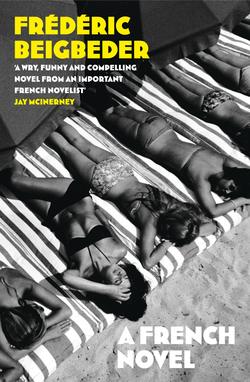Читать книгу A French Novel - Frédéric Beigbeder - Страница 14
7 NATURAL HELLS
ОглавлениеWhen the police descended on us on the avenue Marceau, we were a dozen revellers huddled together, lighting cigarettes around a car whose gleaming bonnet was striped with parallel white lines. We were more like Marcel Carné’s Youthful Sinners than Larry Clark’s junkie Kids. As soon as the siren began to wail, we scattered to the four winds. The officers only managed to net two delinquents, like my grandfather shrimping, delving into the fissures – in this case the entrance to Alma-Marceau métro station, whose shutters were closed at this late hour. While my friend – let’s call him the Poet – was being arrested, I heard him protest, ‘Life is a nightmare!’ The baffled face of the Policeman in front of the Poet will continue to make me smile until my dying day. Two keepers of the peace carried us right up to the bonnet of contention; I remember having enjoyed this exercise in nocturnal levitation. The ensuing dialogue seemed to be perched midway between Poetry and Public Order.
Policeman: ‘What the hell were you thinking, doing something like that on a car?’
Poet: ‘Life is a NIGHTMARE!’
Me: ‘I am descended from a gallant knight who was crucified on the barbed wire of Champagne.’
Policeman: ‘All right, that’s it, take this lot down to Sarij 8.’
Me: ‘What’s Sarij 8?’
Policeman II: ‘The service for reception, research and judicial investigation of the 8th arrondissement.’
Poet: ‘“As human beings advance through life the romance which dazzled the young man, the fabulousss legend which enchanted him as a child, these wither and grow dim of themselvesss …”’
Me (simultaneously brown-nosing and showing off): ‘That’s not his. Surely you must have read Baudelaire’s Artificial Paradises, Captain? You know that artificial paradises exist to help us escape our natural hells?’
Policeman (into his radio): ‘Boss, we’ve got a violation here!’
Policeman II: ‘You’re crazy to do this on a public highway! Why don’t you hide in the bogs like everyone else? That’s provocation, that is!’
Me (wiping the powder from the bonnet of the car with my scarf): ‘We are not everyone else, Commandant. We’re WRRRRITERS. OK?’
Policeman (brutally grabbing my arm): ‘Boss, the apprehended individual tried to destroy a piece of evidence!’
Me: ‘Hey, hey, easy does it, Mr Officer Sir, no need to break my arm. I liked it better when you carried me.’
Poet (with vehement head movements intended to express human dignity and the pride of the misunderstood artist): ‘Liberty is an impossibility …’
Policeman: ‘Can’t you get this guy to shut up?’
Poet (convinced he is convincing, articulating every syllable, one finger raised like a tramp muttering to himself in the métro): ‘The Powers That Be need aaartists to ssspeak truth to power.’
Policeman: ‘Are you playing the fuckwit with me?’
Poet: ‘No, because you’d be sssure to win.’
Policeman: ‘Well, now, I think that warrants a little time in the cells! All right, boys, bang them up!’
Me: ‘But … my brother is being awarded the Légion d’honneur!’
We were levitated into the wailing two-tone car.
I don’t know why, but I immediately thought of a scene from The Gendarme of St Tropez (1964), where Louis de Funès and Michel Galabru run after a group of nudists on the beach to paint them blue. We used to watch it as a family every spring in Guéthary, in the living room that smelled of wood fires, floor polish and Johnnie Walker on the rocks. Another reference would be Pellos’s comic strip Les Pieds nickelés en plein suspense (1963), but I couldn’t work out which of us was Ribouldingue, and which was Filochard.
I had already been in the back of a police car once, during the Paris Salon du Livre in March 2004. I had tried to go up to President Chirac to give him a T-shirt emblazoned with the face of Gao Xingjian. The Chinese were the guests of honour at the Salon that year, but the winner of the 2000 Nobel Prize for Literature, a Chinese dissident living in exile in France and a naturalised Frenchman, had been bizarrely ‘forgotten’ by the organisers. Here, too, muscular arms had lifted me off the ground; here, too, I had found the experience somewhat mind-blowing. I have to admit, I was lucky that time: one of the guys carrying me got a reassuring message on his walkie-talkie.
‘Don’t beat him up, he’s famous.’
That day, I thanked God for my notoriety. They released me after an hour, and the following day my brief incarceration made the front page of Le Monde. One hour spent banged up in a police van in order to seem like a fearless defender of human rights offered an excellent ratio of physical pain to media benefit. This time, they were going to lock me up for a little longer, for a cause that was significantly less philanthropic.
